nn
n
n After Paracelsus fled from Basel, he returned to hisnearlier peripatetic lifestyle, wandering, seemingly aimlessly, across Europenand even making his way into Africa. The lies about him, spread by his enemies,neither followed him or were already waiting for him when he arrived atnsomewhere new, and he lived a life of low taverns, hired horses and grindingnpoverty. He settled briefly at Beratzhausen, on the Danube, and began writingnmedical books, but the rancorous, old-school doctors of Leipzig’s Medical Facultynapplied with all ceremony to the Council of Nüremberg to have no more books bynTheophastrus von Hohenheim printed there.
n
n
n
nParacelsus wrote a letter to thenmagistrates, which was unsent,
n
n
n
n“It is not your business to judge or forbid withoutncareful consideration and discussion: as a matter of fact you are not able tonjudge of my work, you have not intelligence enough.”n
n
n
nAnother letter, whichnwas sent, said,
n
n
n
n“Let those who doubted the truth of his statements meet himnin an open Disputation, which, as formerly so now, he would willingly attend.”n
n
n
n
n
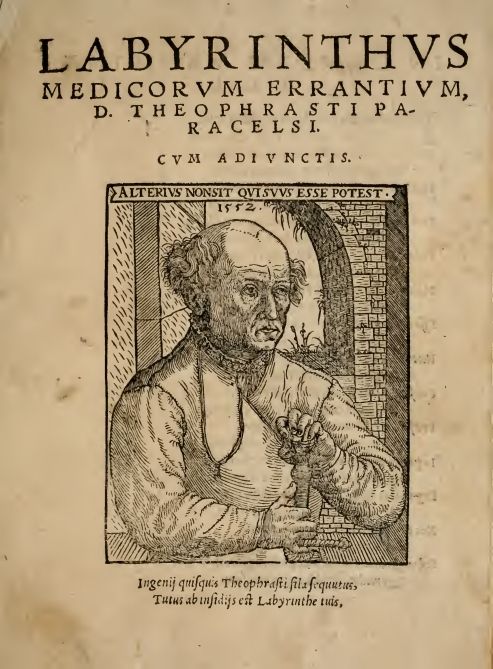 |
| Paracelsus |
n
n
n
nThere was no acknowledgment, only a stony silence, and Paracelsus recorded hisnreaction,
n
n
n
n“They have forsworn physicians – and God mercifully allows themnfour – all fools and even horrors.”n
n
n
nHe continued to write at Beratzhausen fornalmost a year, it mattered little to him where his books were printed, if notnat Nüremberg, then somewhere else would do just as well. His revolutionarynattitude to medicine in some ways reflects the religious upheavals of thenProtestant Reformation that was raging in Northern Europe at the time, althoughnhe objected to being referred to as ‘medicine’s Luther’, however, thenparallels are there, with the attacks on established hierarchies, abusednprivilege, misplaced authority and an unquestioning insistence on tradition.nParacelsus introduced a new way of approaching medicine,
n
n
n
n“The power ofnmedicine is to be understood in two ways, in the great world and in man. Onenway is protective, the other curative. If we protect nature she uses her ownnscience, for without science she would not succeed. But when doctors require tonuse their science, then are they the healers.”n
n
n
nHis attitude was to preventnillness before it took hold, wherever and whenever possible, by simply livingnin a health manner, which included good, fresh food and plenty of fresh air. Ifnillness did occur, his attitude was to assist the body to heal itself fromnwithin (he called this internal healing force ‘mumia’ which is not to benconfused with the practice of using the remains of mummified bodies as anmedicine, which was popular at the time).
n
n
n
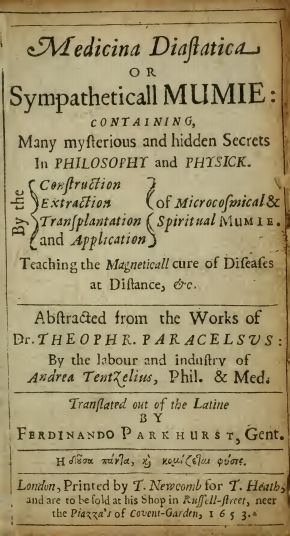 |
| Paracelsus – Medicina Diastatica or Sympatheticall Mumie – 1653 edition |
n
n
n
nHis way was the treat the body andnthe soul together,
n
n
n
n“Rough and harsh are the winds which the truth arousesnagainst its followers, and yet I have ever hoped that He who loves the soul ofnman loves also his body, that He who saves the soul saves also the body, andntherein I have thought to work some little good.”n
n
n
nHe is regarded as thenFather of Toxicology and his attitude to poisons follows a similar thread –
n
n
n
n“Anman may become fat and it is not the fault of his food: or he may become thinnand his food does not help him.”n
n
n
nA thing was not, in itself, poisonous,nwhat mattered was the amount of the dose, too much of anything might provenfatal if wrongly administered, and even evil could drive out evil, if a poisonnwas correctly administered as a medicine. Everything was interrelated, part ofnwhole, and the lesser part mirrored the greater part, microcosm and macrocosm,nGod was in nature and nature was God, and all creation was a single entity.
n
n
n
nAnpart of this philosophy meant that all parts of creation had an effect on onenanother, so substances that had not previously considered to be medicinal werenexamined, including metals, chemicals and minerals – Paracelsus is creditednwith giving the metal zinc its name, seeing the sharpness of thencrystals when smelted, he used the old German word zinke meaningn‘pointed’.
n
n
n
nIn addition, he pioneered the use of iron, sulphur, mercury, arsenicnand antimony, and he discovered that the alkaloids in opium could be moreneffectively dissolved in alcohol rather than water, which he developed antincture of opium that he called labdanum, a name that later became laudanum.nParacelsus had acquired a small quantity of opium in Constantinople and wasnrumoured to carry it concealed in the handle of his sword.
n
n
n
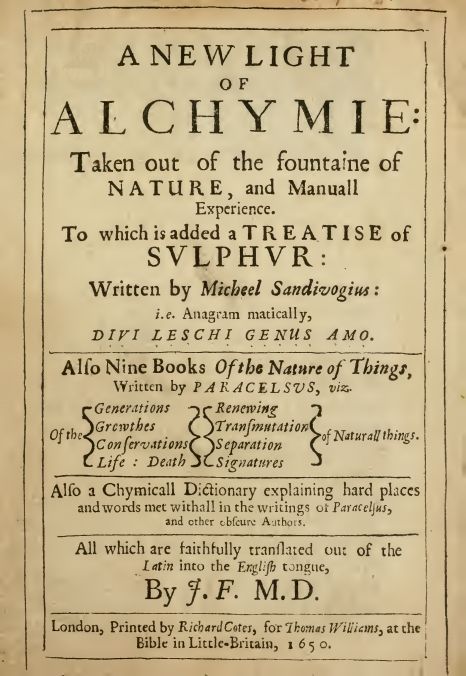 |
| Paracelsus – A New Light of Alchymie – 1650 edition |
n
n
n
nIn a near repeat ofnthe Lichtenfels’ incident, he was called to the bed of Philip, Margrave ofnBaden, who was dangerously ill with dysentery, and cured him within days by thenuse of laudanum; the grateful Margrave thrust a jewel into Paracelsus’ handnwhen he awoke from his stupor but the household staff turned the physician awaynwithout paying the fee, as it was felt that the cure had happened toonquickly. Paracelsus wore the jewel around his neck ever afterwards, as anprotest and token of the outrage (it can be seen clearly in the later portraitsnof him).
n
n
n
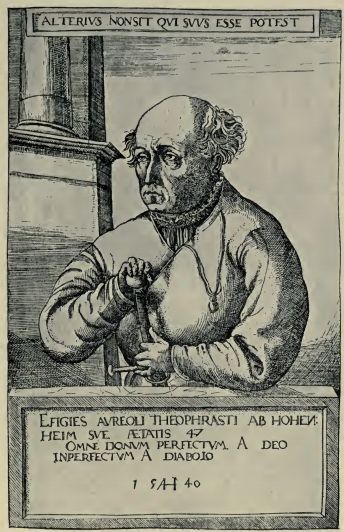 |
| Paracelsus by Hirschvogel |
n
n
n
n
n
nOne such portrait, by Hirschvogel and dated 1540, also shows theneffects that a lifetime of travel and upheaval, and of decades of working withnpoisonous substances; he is drawn, balding and haggard, looking far older thanna man in his late forties. The following year, in September 1541, Paracelsusndied in a room at the White Horse Inn, Salzburg, after making a comprehensivenwill and setting his affairs in order. He was forty-seven years old.
n
n
n
nOnce more, the rumour mills ground outnsalacious stories – he had been murdered by an assassin hired by the doctors ofnSalzburg, he had been thrown from a rock by a gang of ruffians, he had beennkilled with draughts of poisoned wine, ground glass had been put in his beer,nhe had been murdered in a drunken bar-fight, and so on and so forth.
n
n
n
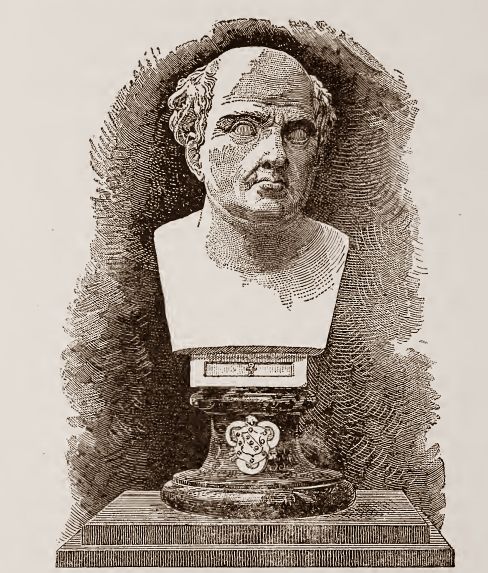 |
| Bust of Paracelsus |
n
n
n
nThe truthnwas that he was a remarkable man, a great scholar, a caring and adept doctor, anpioneering scientist, a prolific author, a hero of humanism, a restless mind inna restless body and a much maligned individual. If anyone deserves anre-evaluation and a restored reputation, it surely must be Philippus AureolusnTheophrastus Bombastus von Hohenheim.
nnn
n
nnn
